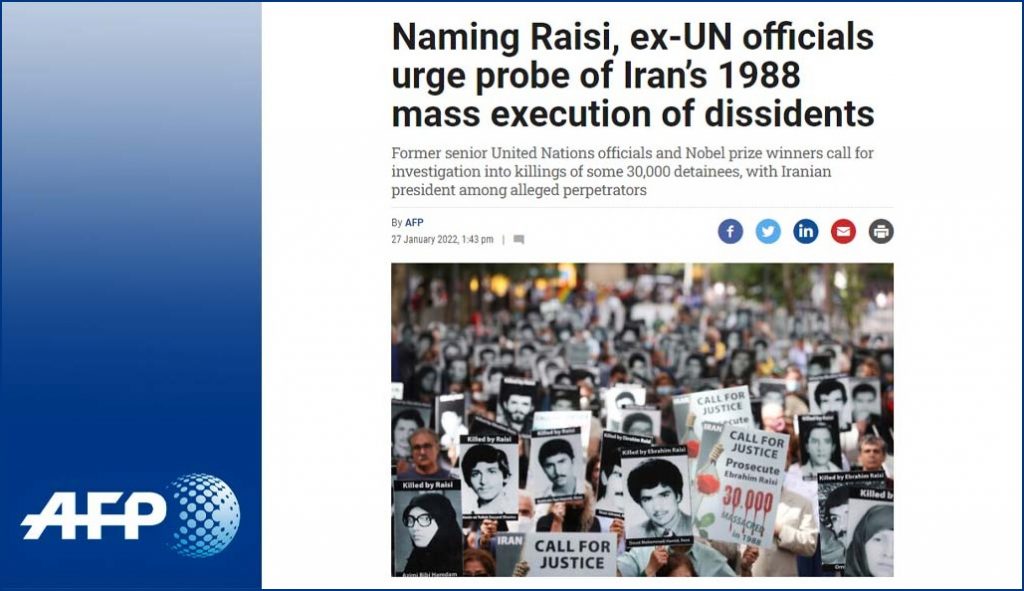The French news agency AFP carried a report about an open letter sent to the Office of the UN High Commissioner for Human Rights Michelle Bachelet and the Member States of the UN Human Rights Council seeking an international inquiry into the 1988 massacre of political prisoners in Iran.
The open letter, organised by JVMI, has been co-signed by 466 current and former UN officials, world leaders, distinguished jurists, human rights experts, Nobel laureates, NGOs, and academic institutions.
Below is the full text of the AFP dispatch, dated 27 January 2022.
UN Urged To Probe 1988 Executions Of Iranian Dissidents
Agence France-Presse, 22 January 2022
LONDON (AFP) — Former senior United Nations officials and Nobel prize winners on Thursday urged the UN human rights office to launch a probe into mass executions of political prisoners in Iran.
An open letter made public calls for the Human Rights Council to launch an international investigation into the killings of some 30,000 detainees in 1988.
It names Iran’s current President Ebrahim Raisi and the head of judiciary Gholam Hossein Mohseni Ejei among the alleged perpetrators, who “continue to enjoy impunity.”
The letter says “thousands of political prisoners who refused to abandon their beliefs were executed. The victims were buried in mass graves scattered throughout the country.”
The killings took place after Iran’s then-spiritual leader Ayatollah Ruhollah Khomeini declared a fatwa on prisoners who supported the People’s Mojahedin of Iran, an opposition group, which Tehran considered a terrorist organization.
Those executed included Marxists and other leftists. Khomeini died in 1989.
“We believe it’s long overdue for the Office of the UN High Commissioner for Human Rights Michelle Bachelet to investigate the 1988 massacre,” the open letter reads.
Ultra-conservative cleric Raisi was elected president of Iran in June last year, replacing Hassan Rouhani.
For opposition and human rights groups, his name is linked to the 1988 executions when he was deputy prosecutor of the Revolutionary Court in Tehran.
Exiled opposition groups say he was part of a commission that sent thousands of jailed opponents to their deaths within a few months.
Raisi has denied involvement in the executions.
In 2019, the US placed Raisi on a sanctions list citing the executions and other alleged rights abuses.
The letter was organized by a London-based association of families of victims called Justice for the Victims of the 1988 Massacre in Iran.
Signatories include ex-senior UN figures such as Joachim Rucker, a former president of the Human Rights Council, and Claude Heller, a former president of the Security Council.
Others signing included the former president of Chile Ricardo Escobar, the former president of the European Commission Jacques Santer and the former Archbishop of Canterbury Rowan Williams, as well as 18 Nobel Laureates.
The National Council of Resistance of Iran, a coalition of opposition groups, last August urged police in Scotland to arrest Raisi for human rights and abuses and genocide if he attended the UN climate summit in Glasgow in November.
Amnesty International and Human Rights Watch have both called for his indictment for human rights violations and crimes against humanity.

